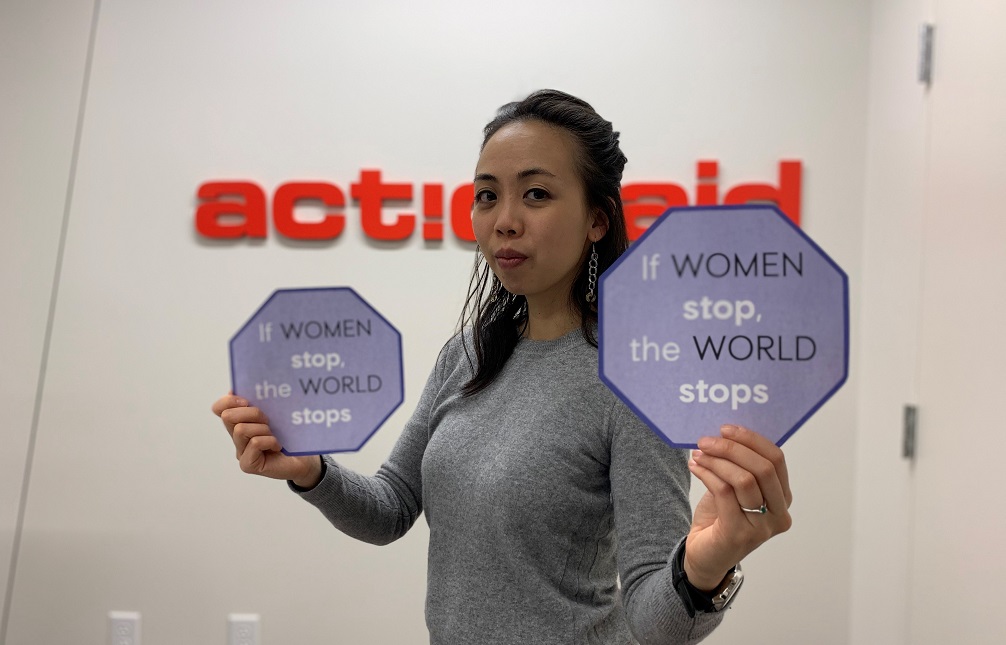By Niranjali Amerasinghe & Jenna Farineau
“Women’s rights are human rights.”
Famous words delivered by then First Lady Hillary Clinton in 1995 at the Fourth World Conference for Women. The conference is best known for resulting in the Beijing Action Plan, which not only recognized women’s rights as human rights but also included guidance for governments and non-governmental organizations to advance women’s rights in policy and society.
Now, 25 years later, feminist organizations and allies from around the world are uniting for International Women’s Day to let the world know that the work is far from done. Women, queer, and non-binary people around the world continue to suffer discrimination and violence.
Due to the COVID-19 outbreak, meetings to prepare for the 25th anniversary of the Beijing Action Plan are on hold. But there are still symbolic actions taking place in the days surrounding International Women’s Day, including the Global Women’s Strike on March 8. And we are lending our voice in solidarity to say: if women stop, the world stops.
Here are our four common asks:
1. Demanding decent work and fair living wages for all
Worldwide, women and girls perform more than three-quarters of the total amount of unpaid care work. This work involves things like caring for relatives, maintaining a household, and collecting water or fuel. If you break it down by region, women in Africa spend triple the amount of time on unpaid care work than men, 1.7 times more in the Americas, and 4.7 times more in the Arab States.
If we paid women minimum wage for all their unpaid labor, it would cost $10.9 trillion globally, with $1.5 trillion in the U.S. alone. The world has taken women’s unpaid labor for granted for too long. It’s time we built a new kind of economy, one that values unpaid care.
2. Ending gender-based violence in the workplace
Violence and harassment are disproportionately affecting women, young people, and LGBTQ+ people. A 2019 survey of 200 garment factory workers in Bangladesh, including 181 women, found that 80% said they had experienced or witnessed sexual harassment or abuse at work.
While there’s still so much work to be done to reverse this reality, things are starting to change. Last June we celebrated the adoption of a historic international law to end violence and harassment in the world of work. This is the first of its kind and now we’re calling on governments to ratify it. In the coming years, we’ll be watching to make sure it is implemented.
3. Ensuring just access to resources, power, and opportunity
Women’s access to land and natural resources is vital for ensuring their right to equality. Lack of control over such resources often results in marginalization and poverty for women and their families. In many societies, women face barriers to access, use and control of natural resources. These barriers include inadequate legal protections and discriminatory cultural practices. We must take steps to overcome such barriers and ensure that women have access to resources and power to drive their destinies.
4. Supporting Food Sovereignty
We believe people have the right to determine what food to eat and how to produce it. With increasing pressure to industrialize agricultural systems, it is essential that we respect the rights of local farmers and communities. In light of gender inequalities that exist in many contexts, it is especially important to support women farmers’ right to food sovereignty.
The Public Financing and Agriculture project in East and Western Africa is doing exactly that –connecting women farmers with agriculture support systems in their own countries. Rather than making farmers reliant on handouts, the project provides training for farmers so that they can better understand how to access government support. They also learn how their national agriculture budgets are put together so that they can hold local officials accountable.
Solidarity within the movement
These commons demands are critical for realizing women’s rights the world over. As the climate crisis worsens and deepens existing inequalities, we must stand together.
Though women continue to be disproportionately impacted by climate impacts, we know that as a collective group we are powerful agents of change who can drive the world to a more sustainable future.
Women’s work, often unseen and largely undervalued, is the bedrock of our societies and economies. And our collective power to demand our fundamental rights can no longer be ignored, because we know that if women stop, the world stops.


